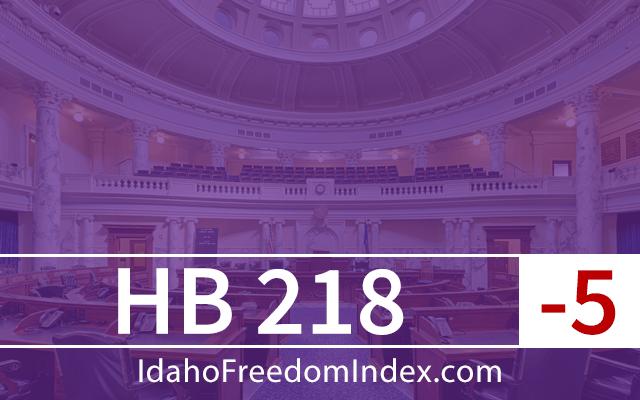


Bill description: HB 218 would establish three new programs to encourage teachers to work in rural schools.
Rating: -5
Does it create, expand, or enlarge any agency, board, program, function, or activity of government? Conversely, does it eliminate or curtail the size or scope of government?
HB 218 would establish three new programs the state Board of Education would be responsible for operating.
The first program would be the Idaho Rural Teacher Fellowship. The state board would organize this program, in which a rural school district would partner with a college or university to provide a teaching fellowship for students who are nearing the end of their education. The fiscal note state that each participating teacher would be provided with $10,000 to cover the costs of the fellowship.
(-1)
The second program would be the Grow Your Own Program for Paraprofessionals, in which the board would provide funding for 30 to 40 credits in a teacher preparation program. This program would be available to individuals who have already spent at least one year working with a school district as noncertified staff.
(-1)
The final program, which would be Rural Certification Incentive Program, would give teachers a stipend to cover the cost of tuition as they seek certification in a content area that a school district has a hard time filling, such as mathematics or computer science. The fiscal note states that teachers participating in this program would receive $6,000 to complete their endorsement or certification.
(-1)
Does it increase government redistribution of wealth? Examples include the use of tax policy or other incentives to reward specific interest groups, businesses, politicians, or government employees with special favors or perks; transfer payments; and hiring additional government employees. Conversely, does it decrease government redistribution of wealth?
The programs established in HB 218 would only be available to rural school districts or local education agencies, defined as “a school district or charter school in Idaho that the state department of education determines is rural, based on the geographic size of the school district and/or the distance of the school district or charter school from the nearest large urbanized area.”
This would allow a select group of school districts and their communities to benefit at the expense of other school districts and taxpayers in the state.
(-1)
Does it increase government spending (for objectionable purposes) or debt? Conversely, does it decrease government spending or debt?
The fiscal note for HB 218 provides no estimation for the costs of operating the three separate programs established in this bill. It can be assumed, however, that these programs would require substantial administrative functions, and the amount distributed to participants would increase spending by the state Department of Education and the state board.
(-1)


